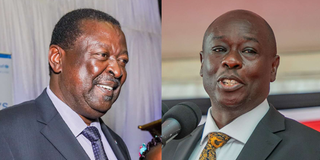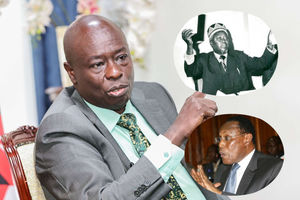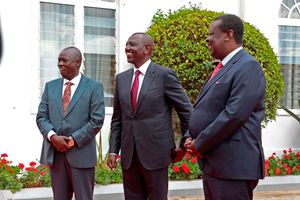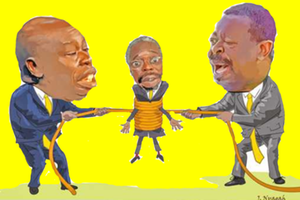
Prime Cabinet Secretary Musalia Mudavadi (left) and Deputy President Rigathi Gachagua.
President William Ruto’s approval of a single deputy party leader position in the United Democratic Alliance (UDA) has handed DP Rigathi Gachagua a major win in his succession ambition.
The decision to amend the UDA constitution to delete provision for three deputy party leaders’ slots, however, appears to jolt Prime Cabinet Secretary Musalia Mudavadi's plan of folding his Amani National Congress (ANC) party.
It was widely expected that Mr Mudavadi would have benefited from one of the slots in what could have elevated him in President Ruto’s 2032 succession matrix.
Mr Mudavadi recently hinted at another political “earthquake”, on the day he gave indications of his plans to fold ANC to join UDA ahead of the 2027 elections.
But when he chaired the party’s National Executive Committee (NEC) meeting on Friday at State House, President Ruto succumbed to sustained pressure from Deputy President Gachagua’s camp. The DP’s allies have been demanding a single deputy party leader’s position, which they want reserved for him.
Deputy party leader
“The President and party leader of the UDA party chaired the National Executive Committee (NEC) meeting today (Friday). The committee approved an amendment of the UDA constitution to create one office of the deputy party leader and two offices of assistant deputy party leaders to align our party’s structural leadership with the national governance structure,” said UDA Secretary-General Cleophas Malala in a statement.
The UDA constitution provides for three deputy party leaders – one in charge of Policy and Strategy, another in charge of Operations while the third one is responsible for the party programmes.
“The committee also sanctioned a detailed review of the party’s constitution, the nomination rules, among other policy documents for further deliberations and approval by the National Delegates Congress,” said Mr Malala.
Mr Gachagua’s allies had described the provision of multiple slots of deputy party leader as a scheme to undermine his influence and an attempt to scuttle his bid to succeed Dr Ruto.
Amendment
Mr Malala on Saturday told Sunday Nation that the amendment means that the President and his deputy will not be subjected to party elections scheduled for the end of the year.
Mr Malala said the amendment was approved to avoid undermining the authority of the DP.
“The two other deputy party leaders would have ended up undermining the authority of the DP. Based on the changes, there would be no contest for the two positions of the party leader and deputy party leader,” said Mr Malala.
On the merger plan with affiliate parties like ANC, Mr Malala said there should be no cause for alarm since there will be room for negotiations should they coalition partners agree to fold.
“The party constitution can be amended when a need arises. There should never be any reason to worry because there will definitely be negotiations when that time comes,” said Mr Malala.
UDA Organising Secretary Vincent Kawaya, who is also the Mwala Member of Parliament said the decision was made so as to avoid unnecessary power struggles.
“There was no sense in having three slots of deputy party leader unless there was a motive to undermine the DP. We can’t allow a scenario where another member of the party will occupy the same position in the party as the DP. We can have multiple office holders in other positions but not for the party leader and deputy,” said Mr Kawaya.
ANC Secretary-General Omboko Milembe also dismissed assertions that the changes have a potential of scuttling Mr Mudavadi’s ambitions of succeeding President Ruto.
Mr Milemba, who is also the Emuhaya MP, said the ANC's goal at the moment is to ensure Dr Ruto is re-elected during the 2027 polls. He said ANC is ready to join hands with their affiliate parties in coming up with a major formation for purposes of the next election.
He said that the deputy party leader’s position cannot be a basis for their decision to fold and join UDA.
“There should be no cause for alarm because we will continue working closely with UDA to ensure the President is re-elected,” said Mr Milemba.
“We have no reason to cajole UDA over what they do with their constitution. We cannot be worried because decisions will definitely be made when negotiating for mergers or coalitions,” he explained.
In the past, creation of multiple deputy party leader positions has been used to undermine and scuttle influence of politicians with higher ambitions.
For instance, in 1997 when the then President Daniel arap Moi’s Kanu and opposition leader Raila Odinga’s National Development Party (NDP) entered into a “co-operation” that later became a merger, Vice-President Professor George Saitoti was a major casuality.
Prof Saitoti was shocked to learn that his name had been removed from the list of vice-chairmen. President Moi would then sideline him in his 2002 succession plan by choosing Uhuru Kenyatta, who later became became Kenya’s fourth President in 2013.
In his book Riding on a Tiger, former Vice-President Moody Awori writes how Prof Saitoti was humiliated at Moi International Sports Centre, Kasarani during the party’s National Delegates Conference.
“He (Moi) then announced a merger between Kanu and NDP and the NDP flag was lowered amidst cheers from the 6,000 delegates. He further announced that it had been decided that in the new Kanu, the position of National Vice Chairman had been abolished and four Vice Chairmen’s positions created,” says Mr Awori in his book.
Owners
According to Mr Awori, President Moi reminded Prof Saitoiti that Kanu had “its owners.”
Kenya’s first Vice-President Jaramogi Oginga Odinga suffered a similar fate in 1966 during the infamous Limuru Conference where his role as the deputy party president was abolished and replaced by eight provincial vice-presidencies at the height of his fallout with the founding President Jomo Kenyatta. Mr Odinga opted out of the race in protest.
President Mwai Kibaki was also humiliated by President Moi during Kanu elections of 1988.
Dr Josephat Njuguna Karanja replaced Mr Kibaki as the party vice-president after the latter opted out of the election.
There had been attempts to rig the Kanu Nyeri branch election for the position of chairman.
Mr Kibaki told off the provincial administration saying: “Rigging has some intelligence. This scheme is by people who have no sense of intelligence.”












